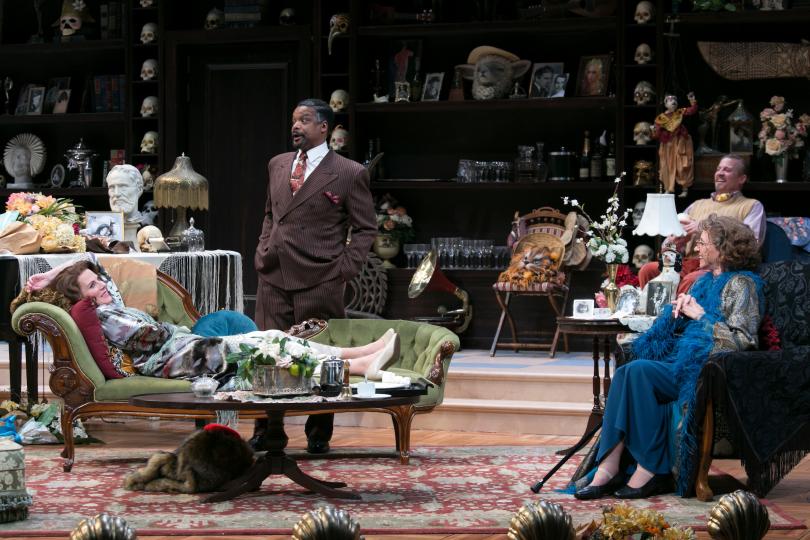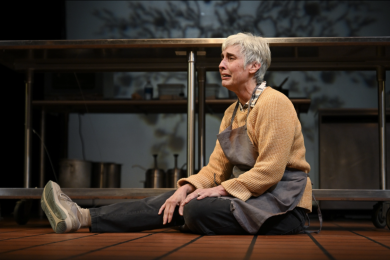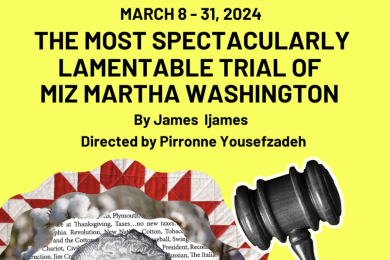Caution: Deconstruction Ahead!

I have always been a fan of George S. Kaufman. Touted as “the most successful playwright in American theater” during the Golden Age of the business, he’s known for his quick wit, high energy and unyielding satire. I was very much looking forward to the second collaboration of Kaufman and Edna Ferber, and had never seen nor read The Royal Family before. The fictional Cavendish Family is loosely based on the Barrymore’s (also a notable theatrical tour de force of the era) and the play exams the lives of three generations of high profile women, in the beginning, prime, and twilight, of their professional acting careers. Sounds like a perfect setting for Kaufman’s aforementioned trifecta.
The show starts off as one would expect, extravagant functioning set, beautifully tailored period costumes and the characters brashly moving through their daily traffic patterns. It’s life as usual in the Cavendish household. Mrs. Fanny Cavendish (Elizabeth Franz) drops the zingers from the start with old school comic aplomb and Perry (David Darrow), the young suitor of Gwen Cavendish, is hilariously period with his stuffy wall street attire and affected speech. His twofer scene with Gwen (Victoria Janicki) is a highlight, (I would gladly spend an evening watching him try and remove his coat). After a while however, I began to feel that the timing was off, just ever so slightly. The lines too precious, the patterns too slow, encumbered perhaps by the grandness of the main staircase- actors had to chug to the top before delivering a directed line. There were some giggles and snorts but I noticed that the first act was surprisingly quiet for a playwright who “is to comedy what Eugene O’Neill is to American drama!”as the George S. Kaufman bio blog claims. A character steps to the edge of the proscenium and flirts with the front row inexplicably breaking the 4th wall, Janicki’s contemporary mannerisms and screechy tantrums make her confusing and unlikeable, and as much as I appreciated Fanny, sadly Ms. Franz was frail to the point of me being more concerned for her the actor than her character as the aged starlett. The swashbuckling brother is entertaining, more for his costume pieces than his overly cartoonish persona, and the family star, Julie Cavendish (Michelle O’Neill), floats in-between seasoned comic charm and Mommy Dearest heightened melodrama. We are watching a comedy right?
As the show goes on the facade of realism begins to disintegrate even more and seep into the design concepts as well. Lighting instruments are rolled on stage and manually focused on the actors speaking. Light bars drop down into the invisible boundaries of the house. The set literally begins to break apart, so that by the third act it’s only a skeletal wall. Through an obstructed view we see, the kitchen, the stable (with a life-size random horse seemingly in the house), and clothing hanging in the bedrooms upstairs. Finally at the very end, a year has passed and Gwen is bringing her newborn ‘round to the family estate. When the anticipated infant inevitably arrives (to take it’s place as the rightful heir to the Cavendish legacy), the nanny enters holding him, unabashedly dressed just like my date; button up shirt, jeans, ankle boots complete with puffy coat and hobo bucket bag!? Five minutes later the family is back to it’s crazy, zany, selves, only to then discover (spoiler alert) dear old Fanny has expired in her arm chair, having fulfilled her duty as matriarch and passing the torch to the next generation…end of play.
I didn’t get it. I didn’t laugh much. I felt silly, and that I had missed something important. Maybe I did. Doing some research on Director, Rachel Chavkin, things began to make a little more sense. Ms. Chaikin is a serious up and comer and one of the founding directors of The Team, a Brooklyn based theatre company described by The Guardian as “theatrical excavators of American culture, American dreams and the American psyche.” They use classic text and multi-sensory immersion to create acclaimed devised work. Since The Team’s conception in 2004, Ms. Chaikin has enjoyed great successes culminating most recently in her award winning direction of Natasha, Pierre & The Great Comet of 1812, which premiered at Ars Nova in 2012 and moved to Broadway in 2016 (It continues to play the Imperial Theatre on Broadway). The Great Comet is a musical adaptation of Leo Tolstoy’s War and Peace, a devised adaptation of the famous novel that uses The American Musical format and audience immersion to upgrade the old novel and put it in a contemporary accessible atmosphere.
Based on interviews and reviews Chavkin is an absolute pro at breaking down the old stories and rebuilding something new and exciting while maintaining integrity and authenticity! The thing is, Kaufman and Ferber’s script is not adapted, it’s not devised and/or recreated from the original, it is the original. The real deal, a 90 year old script, a little dusty perhaps, but with timeless moral value. Women still have the burden of choosing between work, family or trying to juggle both. Life is still the pursuit of happiness whether it’s work, play, trading stocks or treading theatre boards. I appreciate the intentions, and there were some notable moments and beautiful visuals. However, the challenge wasn’t to recreate the play or infuse it with new merit, the challenge was to find a way to complement the existing piece, (perhaps in a contemporary way), because frankly, The Royal Family, still holds it’s own. As with anything as subjective as theatre I would encourage anyone to “go see for yourself” and create your own opinion of this American Classic. There are definitely things to keep you stimulated, a couple of fun scenes and performances, but ultimately, if you’re planning on paying full price for this comedy, I suggest you look into something else to spend your money on.




